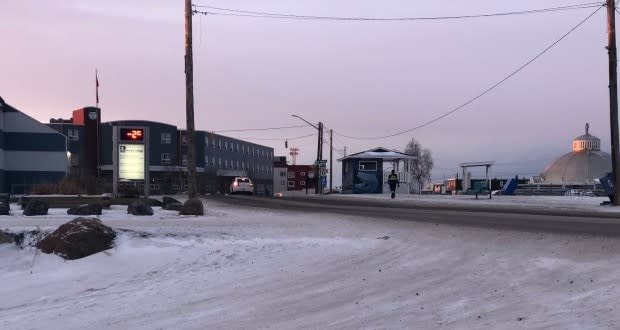Inquest reveals Richard Binder Jr. died days before body found
It was days after Richard Binder Jr. had died before his body was found, according to the forensic pathologist who testified on Wednesday during an inquest into Binder's death.
Binder was on the run from police after an alleged altercation with his partner. Then he went missing, his family said. His body was found on Nov. 3, 2018 by 18-year-old Dale "Jace" Sydney and his friend.
Sydney testified on the second day of the inquest, which was called by the N.W.T. Office of the Chief Coroner in February.
Sydney and his friend were on a trail toward Big Lake, after crossing the East Channel on skidoos. It was a well-travelled trail and he'd been on it before, he said.
That's when they discovered the body near a log, Sydney testified.
"It looked ragged ... his clothing looked damaged," he said, adding he didn't recognize the person.
There were no footprints or snowmobile tracks. Sydney said he didn't know what to do at the time and went back to town to call police.
There was no tipping point where we said it would have to be a search and rescue. - Sgt. Christina Wilkins
It had been five days since police asked for the public's help in finding Binder based on an outstanding arrest warrant, and nine days since he was last seen.
At the time, N.W.T. RCMP requested that Edmonton Police Service conduct an external investigation into Binder's disappearance.
Binder not dressed for the weather
Sgt. Christina Wilkins is in charge of emergency management for the territory's RCMP, including search and rescue. She was asked by Jessi Casebeer, lawyer for the coroner, why there was not a ground search for Binder after he disappeared.
Wilkins answered that "the criteria wasn't met" for search and rescue.
"There was no indication the subject had left the community," Wilkins added. "There was no tipping point where we said it would have to be a search and rescue."
RCMP were tipped off to multiple reported sightings of Binder in town, but none of them could be substantiated.
On Oct. 28, 2018, Binder's mother filed a missing persons report in hopes that a search and rescue would begin.
Wilkins said a ground search at the time "would've provided little benefit," and RCMP officers were following normal procedure by following up on the case.
Wilkins was also questioned on whether Binder's clothing would have prompted the RCMP to start a search and rescue, since she previously said a person's clothes can contribute to that decision.
On the first day of the inquest, Binder's father testified his son was inadequately dressed for the cold weather when he disappeared.
But Wilkins said that Binder was outside when the RCMP last spoke to him on Oct. 25, 2018, after they were called to an alleged altercation. After an officer told him he was being arrested for breaking conditions under his recognizance, Binder had fled on foot.
"He was dressed for the weather at the time," she said.
Environment Canada recorded a low of -8.8 C on the night of Oct. 25, 2018.

Mitchell Weinberg, a forensic pathologist who did the post-mortem examination, said Binder died of hypothermia, and that he was wearing a "not-particularly thick" hoodie, along with a flannel shirt, undershirt, jeans, shoes, socks, belt and a baseball cap.
Weinberg said that Binder also wasn't wearing gloves and that the clothing was "inadequate" for the weather at the time.
Although he couldn't give an exact day when Binder would've died, he could "confidently say he'd been dead for a couple of days before his body was found, based on overall circumstances."
Binder had recently been prescribed medication to help him with anxiety, and an empty pill bottle was found on him.
Weinberg said the toxicology report found a sedative in Binder's system, along with diphenhydramine, an active ingredient in Benadryl. He said although the medications could have possibly put Binder in an "altered medical state," Binder didn't take enough medication for it to be toxic to his system.
K-9 unit should have been consulted: expert
The N.W.T. RCMP said when there is a sudden death or injury that comes from police action, they bring in another agency to investigate.
That handler could've made the decision. - Sgt. James Stirling, expert witness
Sgt. Ken Bruns, who at the time was a homicide detective, was brought in via phone from Edmonton to review the three incidents: the domestic assault, the missing person case, and Binder's death.
He said the primary goal was independence, and to see if "there's a bias or any avenues that weren't explored."
Bruns said the RCMP officers followed the policy well and didn't have any recommendations for what could have been done differently.
He said "unless they found him very quickly that night," he doesn't believe the outcome would have been different, based on the weather and what Binder was wearing.
The final witness was retired Sgt. James Stirling, formerly with the Ontario Provincial Police. He testified as an expert in search and rescue, and in policy.
When asked about how he felt the RCMP did on the case, he said he felt they did well from an investigative point of view, but that a "parallel ground search" should've been initiated. He said officers could have conducted a "search urgency report," which would have told them how vital a search could be.
Stirling said there was enough information to begin a ground search and that "the absence of a clue was a clue in itself."
When asked by Casebeer about whether the RCMP K-9 Unit should have been consulted for a search, Stirling answered "absolutely."
"That handler could've made the decision on if he/she could attend that call or not," he said.
Closing summaries will be made and the jury will give their recommendations on Wednesday.

